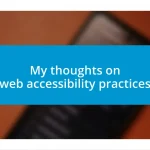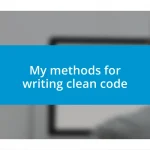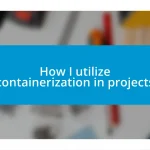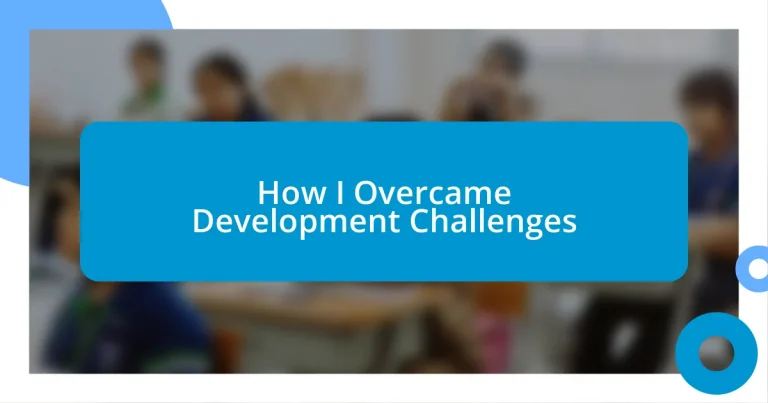Key takeaways:
- Self-reflection and engagement with peers uncovered hidden obstacles, like the fear of failure and perfectionism.
- Implementing structured changes, such as weekly check-ins and breaking goals into manageable tasks, enhanced progress and reduced anxiety.
- Celebrating small wins and embracing mentorship fostered motivation and growth, allowing for a more positive outlook on challenges.

Identifying Development Challenges
Identifying development challenges begins with genuine self-reflection. I remember staring at my to-do list, feeling overwhelmed and confused about where to start. It hit me then: is this clutter on my list a true reflection of my goals or simply a byproduct of external pressures?
As I delved deeper, I noticed patterns in my struggles. For instance, I often found myself juggling multiple projects but neglecting my core passions. This realization was pivotal; it made me question whether I was truly aligned with my objectives. Have you ever found yourself caught in a similar cycle, prioritizing what seems urgent over what truly matters?
Engaging with my peers also shed light on challenges I hadn’t fully recognized. Talking to a friend about their hurdles made me realize that I wasn’t alone in my struggles. It sparked a sense of camaraderie, as we both shared our pain points. Who can you turn to for insights? Opening up to others can often reveal hidden obstacles you might not notice when you’re in your own bubble.

Understanding My Personal Obstacles
Identifying my personal obstacles often felt like digging through layers of my own psyche. One particular instance stands out: I vividly remember the intense frustration I experienced during a project that was close to my heart, yet the progress seemed agonizingly slow. Sleepless nights led me to confront the underlying fear of failure that had been festering for years. Have you ever felt that knot in your stomach when you realize your fears are holding you back? Unpacking that fear became a crucial step in understanding my personal roadblocks.
I also discovered that my tendency to procrastinate stemmed from a desire for perfection. I think back to multiple occasions where I put off starting projects until I had the “perfect” plan. That led to missed deadlines and mounting anxiety. Sounds familiar? It took time for me to realize that striving for perfection often paralyzed my creativity, leaving me feeling stuck. Acknowledging this was liberating; it encouraged me to adopt a more forgiving attitude towards my work, fostering progress instead of paralysis.
Lastly, the emotional toll of comparison loomed large in my journey. I can recall scrolling through social media and feeling inadequate as I saw peers advancing in their careers. This constant comparison added to my sense of isolation. Have you ever found yourself in similar shoes, feeling overshadowed by others? I learned that distancing myself from these distractions and focusing on my unique path allowed me to embrace my challenges head-on, turning them into opportunities for growth.
| Obstacle | Description |
|---|---|
| Fear of Failure | Confronting the fear that held me back from pursuing my passions. |
| Perfectionism | The desire for flawless execution that led to procrastination. |
| Comparison | Emotional distress caused by comparing my journey to others. |
Researching Effective Solutions
Researching Effective Solutions
When I set out to find effective solutions to the challenges I faced, I didn’t want to rely solely on textbooks or generic advice. Instead, I dove into my own experiences, reflecting on what had worked for me and what hadn’t in the past. I found great value in seeking out success stories from those who had encountered similar obstacles. Their journeys served as a kind of roadmap, guiding me toward potential solutions that felt relatable and achievable. For instance, I remember reading about a mentor who had transformed their procrastination habits through time-blocking—an approach I decided to try myself. It was a game changer! Has anything inspired you similarly recently?
Conducting thorough research also meant using diverse resources. I explored articles, podcasts, and even online forums where people shared their personal strategies. Here are some effective methods I discovered through my research:
- Peer Learning: Engaging with friends and colleagues who faced similar challenges inspired fresh perspectives and ideas.
- Case Studies: Analyzing specific success stories helped me visualize solutions in my own context.
- Professional Development: Attending workshops not only provided insights but also facilitated networking with like-minded individuals.
- Reflection Journals: Keeping a journal allowed me to document what worked and what didn’t, fostering a clearer path forward.
These approaches genuinely shaped my understanding and ultimately equipped me with the tools I needed to navigate my challenges more effectively.
Implementing Changes Methodically
Implementing changes methodically was crucial for my growth. I remember one project where I implemented weekly check-ins with myself. These moments allowed me to assess my progress and adjust my strategies as needed. Have you ever taken the time to reflect mid-journey? I found that these small pauses were often more enlightening than I anticipated.
In my experience, breaking down larger goals into smaller, manageable tasks made all the difference. I once faced a daunting project that felt overwhelming at first. By outlining specific steps and setting deadlines for each, I felt a sense of achievement as I completed them one by one. It’s like climbing a mountain—you might not reach the peak in one leap, but every step gets you closer to the top. Isn’t it satisfying to feel progress, even in tiny increments?
Finally, I learned the importance of gathering feedback throughout the process. After completing a draft of my work, I reached out to trusted friends for their thoughts. Initially, I was nervous about what they’d say, but their insights turned out to be invaluable. Embracing constructive criticism helped refine my approach and build my confidence. Have you ever sought feedback, only to be pleasantly surprised by the outcome? Taking it step by step not only eased my anxiety but fostered a collaborative spirit that made the entire experience enjoyable.
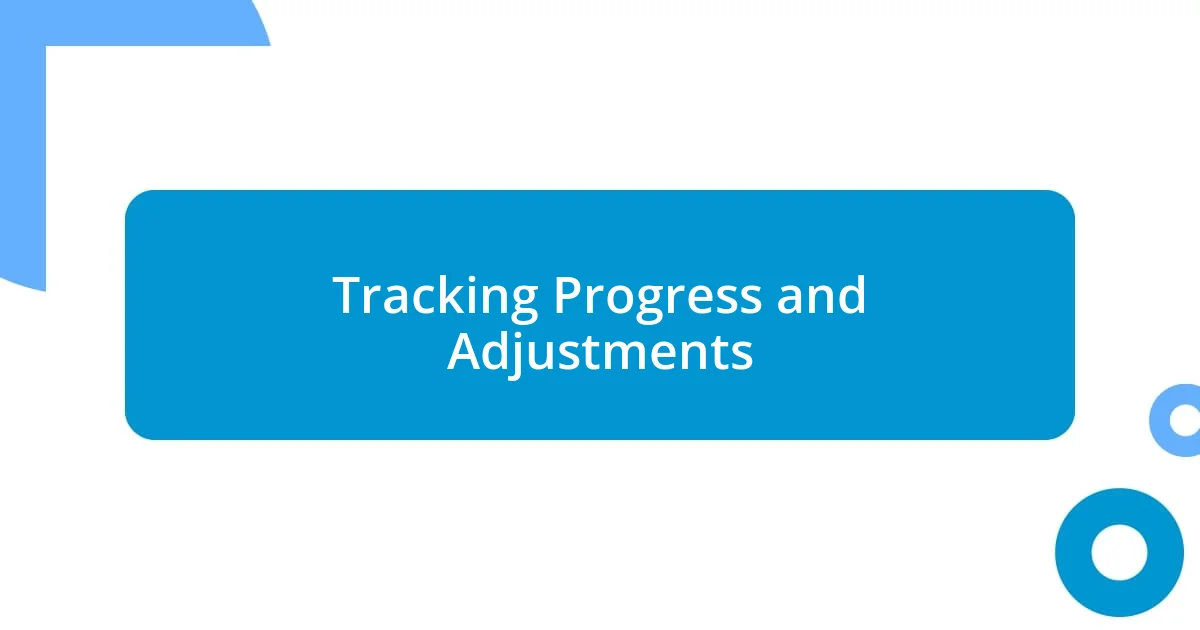
Tracking Progress and Adjustments
Tracking progress isn’t just a checkbox on a to-do list; it’s a vital practice that can transform your journey. When I embarked on a new project, I started using a simple tracking sheet, and it became a powerful tool for me. Each day, I noted what I’d accomplished and identified areas where I struggled. This practice created a real-time reflection that not only kept me motivated but also illuminated trends in my productivity. Have you ever noticed how acknowledging small wins can shift your mindset entirely?
As I continued to track my progress, I realized adjustments were necessary for ongoing success. There were times when I set ambitious goals that later felt unrealistic. For instance, I once aimed to master a complex software in a week, and quickly learned that wasn’t feasible. So, I recalibrated my expectations and set a more reasonable timeline. This shift not only reduced my anxiety but also fostered a deeper understanding of the material. Isn’t it amazing how adjusting your approach can unlock new levels of learning?
Ultimately, tracking progress requires honesty about your journey. I found that sharing my tracking methods with a close friend encouraged accountability and made the process enjoyable. We would regularly compare notes, discuss our findings, and cheer each other on. This collaboration not only enriched my insights but reminded me that we’re all navigating our paths in unique ways. Have you considered involving someone else in your tracking process? It can completely change the dynamics of how you perceive your growth.
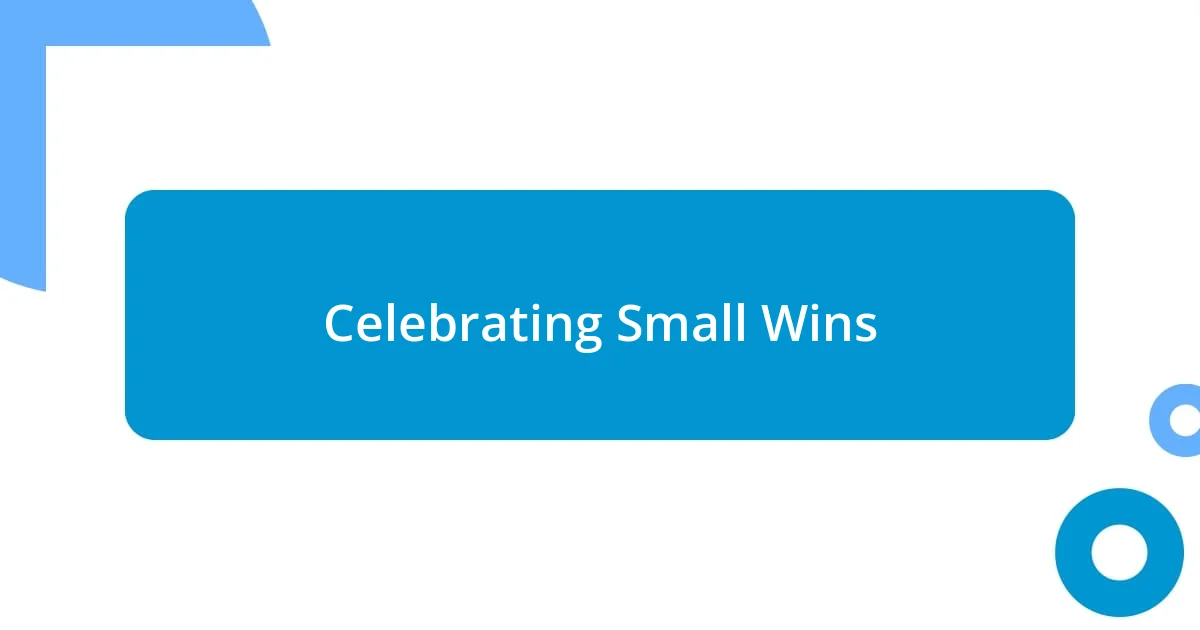
Celebrating Small Wins
Celebrating small wins is like adding fuel to your motivation fire. I still remember the day I finished drafting a particularly challenging section of a project. I was thrilled! Instead of brushing it off, I took a moment to acknowledge my effort. I celebrated by treating myself to a favorite snack. It might seem trivial, but that little acknowledgment genuinely lifted my spirits and pushed me to tackle the next task with renewed energy. Have you ever thought about how a small celebration can shift your entire mood?
I found that keeping a journal helped me document these small victories. Each time I crossed something off my list, I would write it down, no matter how minor it seemed. Reflecting back on those entries was illuminating. It reminded me of how far I had come, especially during tough times when self-doubt crept in. The process kept my mind focused on progress rather than perfection. Do you have a method for tracking your achievements? You might be surprised at how encouraging those reminders can be.
It’s fascinating how celebrating small wins creates a positive feedback loop. Each time I recognized one, I felt more empowered to tackle the next challenge. For example, after completing a particularly difficult task, I used to reward myself with a short walk or even just a few minutes enjoying a favorite song. These brief pauses not only rejuvenated my mind but also helped me develop a habit of appreciation. In retrospect, I can clearly see how those tiny milestones made the big picture much more manageable. Have you noticed how there’s always something worth celebrating in your own journey?
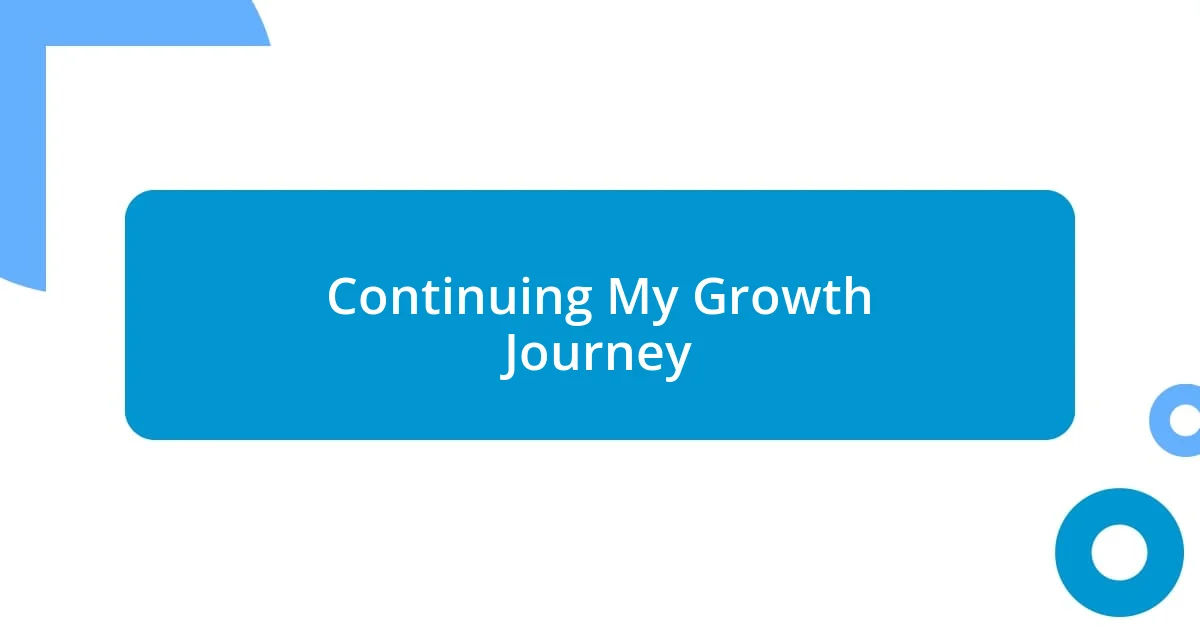
Continuing My Growth Journey
Continuing my growth journey has often felt like navigating a winding path with unexpected turns. There was a period when I struggled to balance my personal development with other life responsibilities. I took a step back, reminded myself of my core motivations, and created a flexible schedule that allowed for growth without overwhelming me. Have you ever found that stepping back can bring clarity to your goals?
As I moved forward, I recognized the importance of mentorship in my journey. I vividly recall reaching out to a colleague I admired for advice on a project I was tackling. That conversation opened my eyes to new perspectives and strategies, reinforcing the idea that learning from others can lead to significant breakthroughs. Have you ever considered how a simple conversation could turn into a catalyst for your own progress?
Embracing discomfort has also become a cornerstone of my growth. I remember pushing myself to speak at a workshop, even though public speaking used to terrify me. The rush of adrenaline transformed into excitement as I engaged with the audience, and I discovered that facing my fears was a crucial step in my development. Isn’t it incredible how taking risks can reshape our self-perception and open doors we never thought possible?


